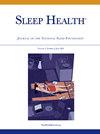Social connectedness and sleep in Blackfeet American Indian adults
IF 3.4
2区 医学
Q2 CLINICAL NEUROLOGY
引用次数: 0
Abstract
Objectives
A growing body of work documents a link between indices of social connectedness and sleep health. Sleep is implicated in the chronic health conditions which disproportionately affect American Indian adults, however the relationship between social connectedness and sleep health is largely understudied in this population. The current project investigates relationships between multiple indices of social connectedness and sleep health in a sample of American Indian adults.
Methods
In a sample of 275 American Indian adults residing in the Blackfeet Nation in Montana, we investigated links between social networks, loneliness, existential isolation (i.e., feeling alone in one’s experiences) and sleep health. We used one linear regression model controlling for demographics and symptoms of anxiety and depression to investigate the relationship between measures of social connectedness and sleep health.
Results
Existential isolation was the only statistically significant predictors of sleep health, with higher existential isolation relating to worse sleep health.
Conclusion
Existential isolation may be a particularly important measure of social connectedness in American Indian adults. More research is needed to understand precursors of existential isolation and the mechanisms contributing to the relationship between existential isolation and sleep health in Blackfeet American Indian adults.
Blackfeet 美洲印第安成年人的社会联系和睡眠。
目的:越来越多的研究记录了社会联系指数与睡眠健康之间的联系。睡眠与美国印第安成年人的慢性健康状况密切相关,而这些慢性健康状况对美国印第安成年人的影响尤为严重。本项目以美国印第安成年人为样本,调查了社会联系性的多个指数与睡眠健康之间的关系:方法:我们以居住在蒙大拿州布莱克菲特部落的 275 名美国印第安成年人为样本,调查了社交网络、孤独感、存在孤独感(即在经历中感到孤独)与睡眠健康之间的关系。我们使用一个线性回归模型来研究社会联系与睡眠健康之间的关系,该模型对人口统计学、焦虑和抑郁症状进行了控制:结果:存在孤独感是唯一在统计学上对睡眠健康有显著影响的预测因素,存在孤独感越高,睡眠健康状况越差:结论:对于美国印第安成年人来说,存在孤独感可能是衡量社会联系的一个特别重要的指标。需要进行更多的研究,以了解黑脚美洲印第安成年人存在孤独感的前兆以及导致存在孤独感与睡眠健康之间关系的机制。
本文章由计算机程序翻译,如有差异,请以英文原文为准。
求助全文
约1分钟内获得全文
求助全文
来源期刊

Sleep Health
CLINICAL NEUROLOGY-
CiteScore
6.30
自引率
9.80%
发文量
114
审稿时长
54 days
期刊介绍:
Sleep Health Journal of the National Sleep Foundation is a multidisciplinary journal that explores sleep''s role in population health and elucidates the social science perspective on sleep and health. Aligned with the National Sleep Foundation''s global authoritative, evidence-based voice for sleep health, the journal serves as the foremost publication for manuscripts that advance the sleep health of all members of society.The scope of the journal extends across diverse sleep-related fields, including anthropology, education, health services research, human development, international health, law, mental health, nursing, nutrition, psychology, public health, public policy, fatigue management, transportation, social work, and sociology. The journal welcomes original research articles, review articles, brief reports, special articles, letters to the editor, editorials, and commentaries.
 求助内容:
求助内容: 应助结果提醒方式:
应助结果提醒方式:


